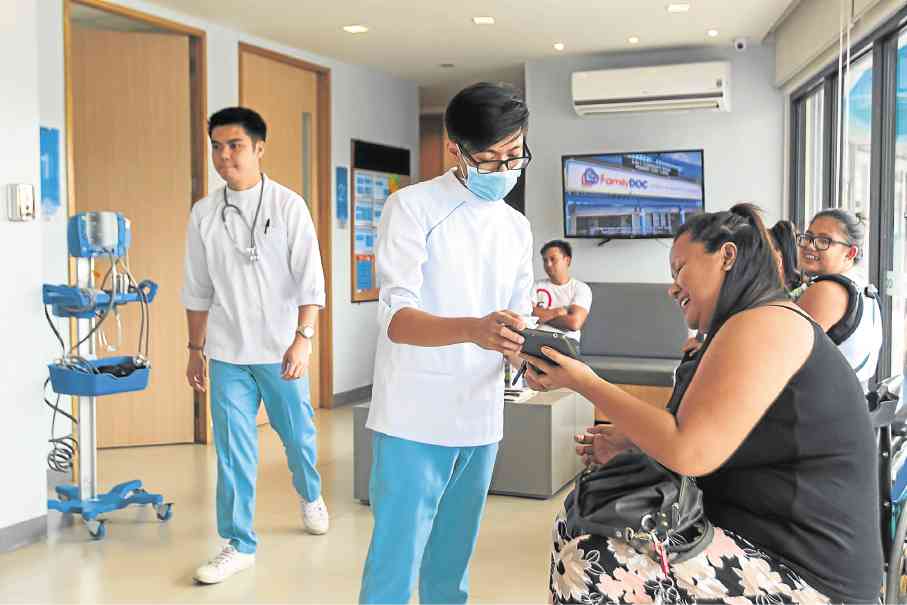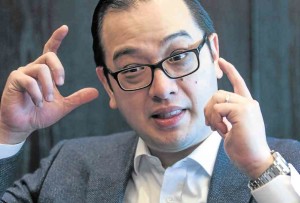Ayala group’s FamilyDoc chain promises to revolutionize PH healthcare sector

The FamilyDoc clinic in Cavite is busiest on weekends. Paolo Borromeo sees bright prospects for AC Health—PHOTOS BY LEO M. SABANGAN II
There’s a new doctor in town; rather, a “family” of doctors, who are responding to an apparent need in the country’s healthcare industry—medical centers that can provide affordable, accessible, and high-quality primary care to middle-income earners willing to invest in their well-being.
In different suburbs across Metro Manila and the greater Manila area, small community-based clinics called FamilyDoc have begun to pop up since the beginning of the year.
It’s a concept which Ayala Healthcare Holdings Inc. (AC Health), a subsidiary of Ayala Corp., came up with after “a huge amount of research” on the healthcare industry, says AC Health chief executive officer Paolo Borromeo.
“We spent around one full year looking at the sector end-to-end,” says Borromeo, “We realized that there were so many areas that needed improvement where private sector could, hopefully, help, and we decided to throw our hat into the ring.”
Based on their interviews with middle-class communities living in suburban areas, Borromeo says they found that such areas still lacked convenient access to affordable clinics for basic consultations and primary healthcare concerns. They would have to go to either a barangay health center, which is not fully equipped and is almost always packed with people; or the emergency room of a private hospital, which is also crowded and is usually still a bit of a drive from their homes.
“What we did was we put [FamilyDoc] right in the middle of their community. Right outside of their villages, in community malls,” Borromeo says. There are now two FamilyDoc clinics in operation: one in Barangay Buhay na Tubig, Imus Cavite; and the other in Las Piñas City. Four more are set to open before the year ends, also within the Las Piñas and Cavite areas.
Each FamilyDoc branch is a “three-in-one” medical center, offering the services of a clinic, diagnostic facility (with laboratory and imaging), and pharmacy. Basic consultation costs around P300, while laboratory tests cost half that charged by private hospitals.
“Ultimately, the goal of FamilyDoc is access,” says Dr. Mike Santos, AC Health medical director, who is assigned to the branch in Brgy. Buhay na Tubig. “We’ve [also] made it so affordable that instead of [patients] asking their neighbor what to take for a cough, they go to their primary care doctor. That’s what we want to happen in all FamilyDoc branches: That people will trust us enough to give preventive care,” Santos adds.
That isn’t to say that FamilyDoc is competing with barangay health centers or private hospitals, Santos clarifies.
“We have very good relationships with the barangays. We serve to augment, and there is a very defined line which we don’t cross. This is what we can give; anything beyond that, we refer [to other medical institutions],” he says.
“Before we even opened, we made it a point to talk to the [health centers]. We even took it up to the city level, so we can complement their programs,” adds AC Health deputy general manager Paul Derroca, who is in charge of finding the best sites for FamilyDoc clinics.
Which means that while FamilyDoc promises to have a doctor on duty during its operating hours of 7 a.m. to 10 p.m. from Monday to Saturday, the clinics are not fully equipped to respond to emergency cases. The best they can offer is first-aid, should an emergency happen.
“For example, if someone needs a cast before being transported to the hospital, that we can provide,” says Santos, “For [victims of] vehicular accidents, wherein the patient is wounded and bleeding, immediately we can stitch him up, give tetanus shots, medical management.”
Since they opened, Derroca says FamilyDoc now has on record over 8,000 regular patients.
They keep track of these patients through a centralized database, which also makes it easy for any branch to pull out a person’s information from any FamilyDoc branch.
More than providing people with better primary healthcare, Borromeo says he also hopes FamilyDoc will encourage physicians to consider general practice as a viable career option.
“The general practice isn’t really the most attractive to our doctors. It’s usually last on the list, which we feel is unfortunate, because primary care is what the country mostly needs. It’s one way to treat early, minimize costs, and most importantly, keep our people healthy,” he says. “I’m hoping that as we gain more traction, doctors see primary care as a career option. If we open a hundred of these clinics, we will need them.”

